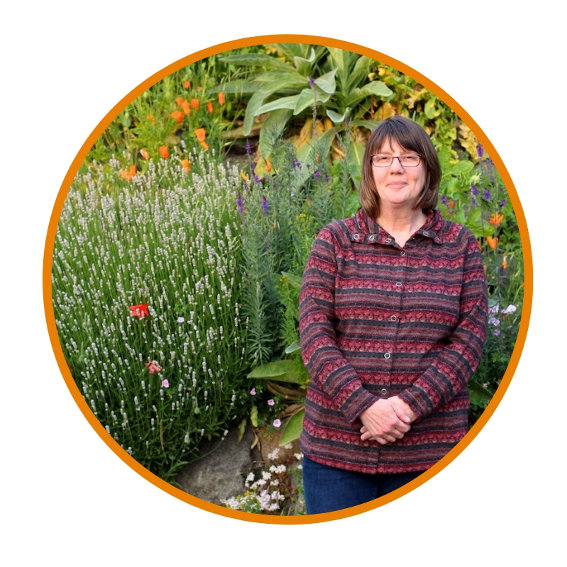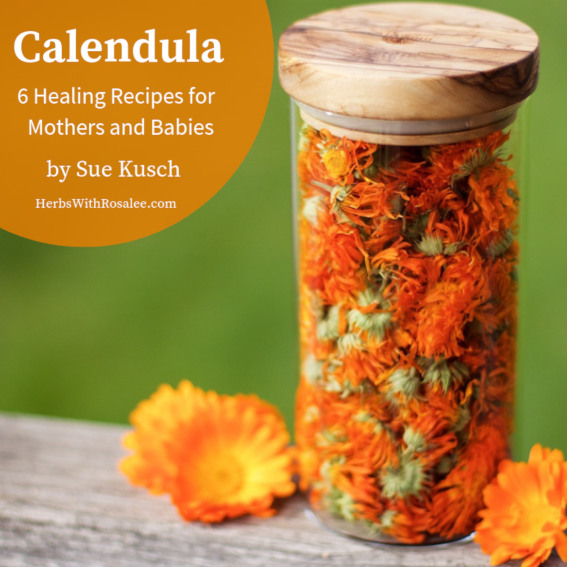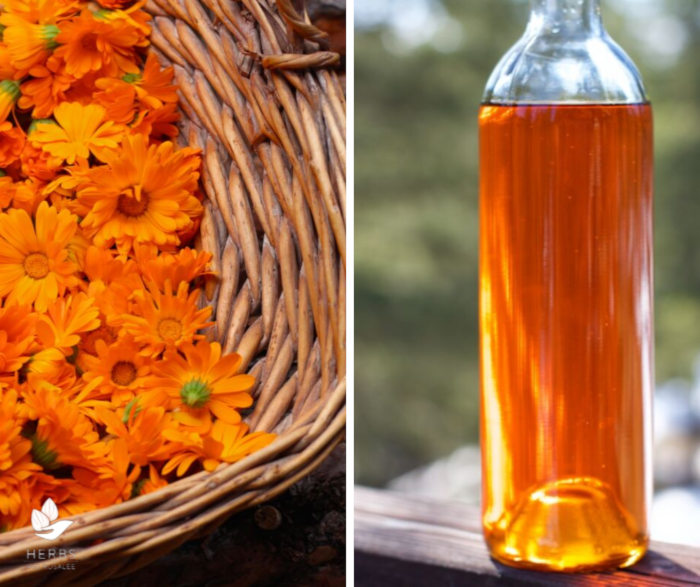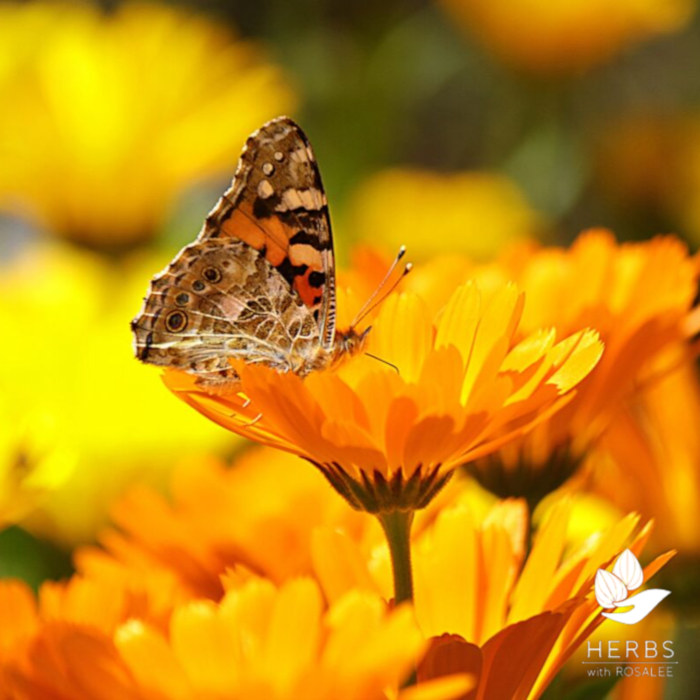Get weekly tips, recipes, and my Herbal Jumpstart e-course! Sign up for free today.
Calendula Recipes for New Mothers and Babies
Share this! |
|
|
In this article we'll explore several calendula recipes that can benefit new mothers and their babies. Calendula is a human magnet: plant it in your garden and then watch visitors instinctively walk closer to the calendula patch. Then wait for the smile. The bright yellow and orange flowers of calendula can’t help but encourage cheerfulness and optimism. There’s nothing fancy about calendula: classic daisy-like flower structure of the Asteraceae with long leaves that gracefully bend as if in awe of the abundant flowers. Native to central and southern Europe and North Africa, calendula has been used for centuries as a healing herb but it also found a use in 17th-century cheese-making as an orange dye which was used to perpetuate a bit of a fraud on cheese buyers.1 Historically referred to as “poor man’s saffron,” European peasants used the flowers as an immune tonic, tossing them into soups and stews.2 |
Calendula offers a plethora of healing gifts: internally, it’s used for clearing the lymphatic system, repairing and healing the intestinal lining, offers mild support for the liver, modulates the immune system and soothes the digestive tract. Calendula has a long list of healing properties: antimicrobial, anti-inflammatory, anti-fungal, astringent, immune-modulating, lymphatic, hepatic, emmenagogue (stimulates/increases menstrual flow) and antispasmodic. But calendula is best known, both historically and currently, as a skin herb and as a vulnerary - a wound healer.
While calendula certainly earns its place in the home medicine chest for its multiple uses, there is a special time when the vulnerary healing gifts of calendula shine: postpartum care for new moms and babies. Most baby shower gifts are practical and for the baby but I think we often forget that new moms benefit from a big dose of TLC during postpartum recovery. Creating and giving a postpartum wellness gift basket likely won’t elicit the “oohs and ahs” that a handmade baby blanket or an adorable pair of baby shoes will but it is the gift that the new mom will appreciate throughout her weeks-long recovery. I suggest the following calendula recipes for a Postpartum Wellness Gift Basket.
Start with a quart of calendula-infused oil and beeswax for the salves/balms. If available, incorporate the additional herb-infused oils that are suggested.
Basic Calendula Salve Recipe
- Melt 1 ounce of beeswax in a double boiler.
- Add 4 ounces of calendula-infused oil and mix thoroughly.
- Remove from heat and quickly ladle into glass jars.
- Allow the salve to completely cool and harden before placing a lid on the jars.
This salve can be used on sore and cracked nipples, for inflamed and irritated baby butts and for cradle cap. Make several jars and label one as Butt Balm and another as Nipple Balm.
Additional oils to include: Substitute one ounce with one of the following infused oils: St.John’s Wort, chickweed, plantain or marshmallow root.
Calendula Recipes: Postpartum Massage and Infant Massage Oil
Most women experience cramps and soreness after giving birth. No surprise, giving birth is a one-of-a-kind workout! This massage oil can be used to massage mom’s legs and abdomen. It can also be used for infant massage, a therapy that soothes and relaxes both mother and child.3
Combine 3 ounces of calendula-infused oil and 3 ounces of lavender-infused oil and pour it into a container with a squirt cap. If lavender-infused oil is not available, add 20-30 drops of lavender essential oil to 6 ounces of calendula-infused oil.
Calendula Recipes: Healing Herbs For the Perineal Area
The perineal area - birthing headquarters for vaginal deliveries - will be inflamed and tender and if a tear or episiotomy occurred, the area can be sore, itchy and in need of soothing and healing. I adapted this healing herb blend from herbalist, midwife and physician, Aviva Romm. It can be used for sitz baths, with a peri bottle or with postpartum pads (cold or warm).
Calendula Recipes: Postpartum Sitz Tea
Ingredients
- 1-ounce dried comfrey leaf
- 1-ounce calendula flowers
- 1-ounce lavender flowers
- 1-ounce chamomile flowers
- 1/2 ounce dried sage leaf
- 1/2 cup sea salt
Directions
Bring 2 quarts of water to a boil.
Turn off heat, and place 1 ounce (approximately 1 large handful) of tea blend (do not add the salt) into the pot. Steep, covered, for 30 minutes.
Strain the liquid well with a fine mesh strainer and discard the herb material. Add 2 quarts of liquid to the sitz tub and then add the 1/2 cup of salt.
Provide a bottle of alcohol-free witch hazel in the gift basket, and include the directions below for Postpartum Cold Packs. If giving as a gift, consider doubling or tripling the amounts to make a generous bag that can last for the first month after giving birth.
Calendula Recipes: Postpartum Cold Packs
Witch hazel (Hamamelis virginiana), a shrub native to North America, has been used for centuries in American folk medicine. It soothes and heals inflamed and irritated skin. NOTE: Some people may experience irritation to witch hazel when topically applied. In your directions, ask the gift recipient to do a test on a patch of skin not irritated to see if she has a reaction.
Directions
Add ½ cup of alcohol-free witch hazel to 1.5 cups of the Postpartum Sitz tea (see above). Pour into a spray bottle.
Lay 3-5 thick sanitary (chlorine-free) pads and spray each one until it is wet but not soaking. Loosely fold each pad in half and tape closed. Place the wet pads in a freezer bag and freeze. Use frozen to help with both healing and pain relief.
Calendula Recipes: Calendula Sitz Spray
Use this spray to help for healing and pain relief.
Add 1 ounce of witch hazel to 3 ounces of Postpartum Sitz Tea and pour it into a small glass spray bottle. Use several times a day.
Calendula Recipes: Herbal Baby Powder
Easy to make, soothing and healing, this herbal baby powder is far better for the baby than commercial products which are made with talc, an industrial-mined mineral that has tested positive for trace amounts of asbestos.
- 1 cup arrowroot powder
- ½ cup French white clay
- 2 tablespoons dried, finely powdered calendula flowers
- 2 tablespoons dried, finely powdered chamomile flowers
Combine and store in a glass container with a shaker top.
Whenever giving herbal products as a gift, always include a list of all ingredients used, how to properly use the product (including dosage, if appropriate), any possible contraindictions and your phone number in case of questions or a request for more! Like calendula flowers that continuously bloom until the first hard frost, a calendula postpartum care package will quietly soothe and heal the new mom and baby for a month or two.
Citations for Calendula Recipes
1. Aubrey, Allison. "How 17th Century Fraud Gave Rise To Bright Orange Cheese." NPR. November 07, 2013. Accessed August 14, 2019. https://www.npr.org/sections/thesalt/2013/11/07/243733126/how-17th-century-fraud-gave-rise-to-bright-orange-cheese.
2. Wood, Matthew. The Earthwise Herbal: A Complete Guide to New World Medicinal Plants. Berkeley, CA: North Atlantic Books, 2009.
3. "Infant Massage: Understand This Soothing Therapy." Mayo Clinic. April 27, 2018. Accessed August 13, 2019.
4. "Healing Herb Baths for New Mamas." Aviva Romm MD. January 30, 2018. Accessed August 13, 2019. https://avivaromm.com/postpartum-herb-baths/.

Sue Kusch, a former community college instructor and academic advisor, incorporates her experiential wisdom, expertise and science-based research garnered from her three decades of growing vegetables, fruit and herbs into her educational writing about plants and how people use them. In addition to her BA in Social Sciences and Masters in Education, she completed the Master Gardener training in 2011 and two permaculture courses in 2001 and 2014. She has studied medicinal and nutritional uses of herbs, including studies at Herbmentor and East West School of Planetary Herbology, since 1997. An avid reader, lover of historical and folkloric information, and a promising storyteller, Sue writes about the intersection of plants and people.


